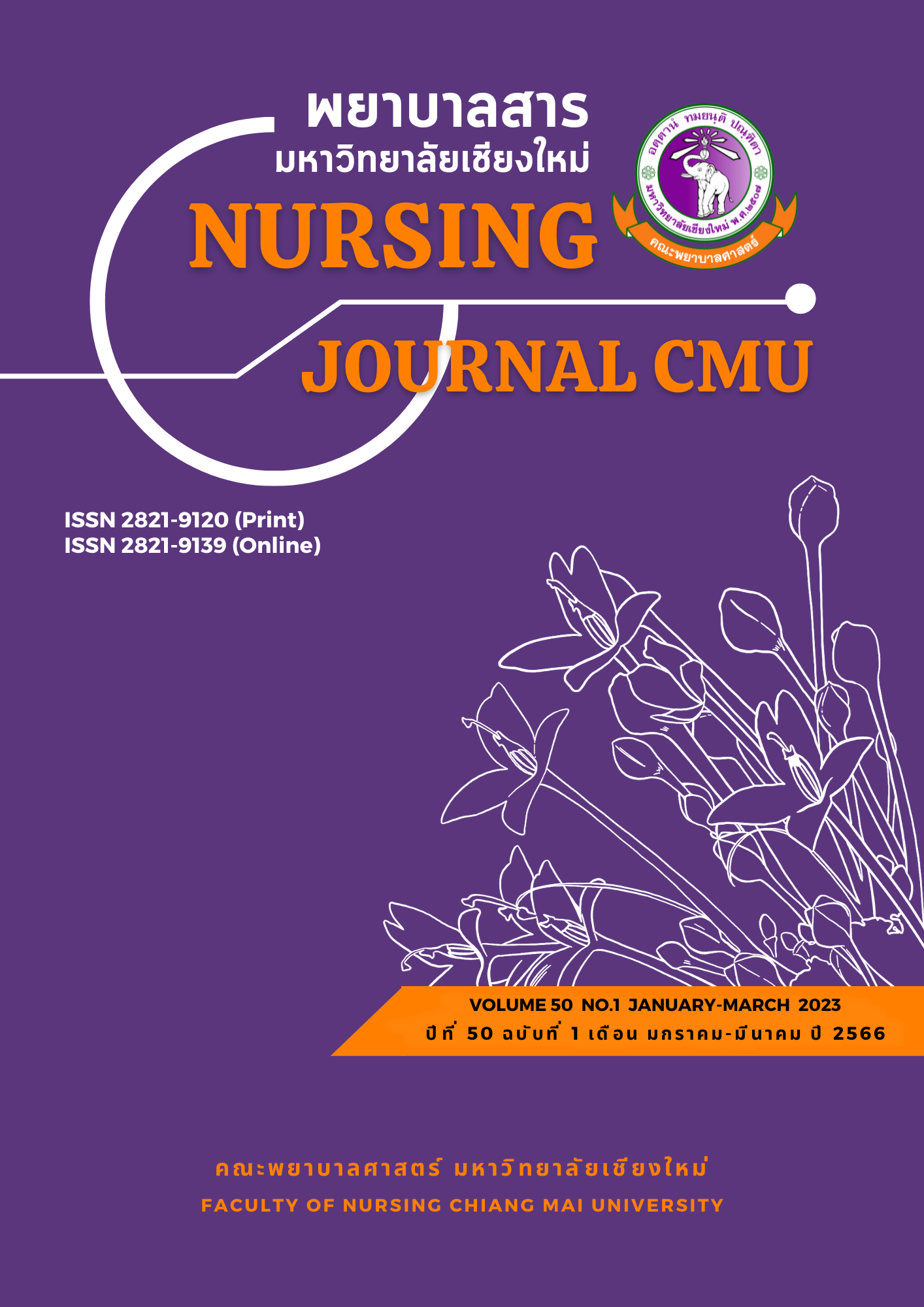The Effectiveness of Implementing the Klaibann Samannjai Program Among Persons with Alcohol Dependence, Thanyarak Chiang Mai Hospital
Keywords:
The Klaibann Samannjai Program, Persons with alcohol dependence, Alcohol dependenceAbstract
Alcohol dependence is a psychiatric disorder that arises from alcohol misuse. It is a major problem, nationally and globally. Most persons with alcohol dependence (PADs) relapse on alcohol after discharge from hospital and are re-admitted to the hospital. The purpose of this study was to examine the effectiveness of implementing the Klaibann Samannjai Program among PADs who were admitted to Thanyarak Chiang Mai Hospital. The participants were purposively selected and consisted of three groups: 1) ten PADs who were admitted for alcohol detoxification at Thanyarak Chiang Mai Hospital, as well as for an ongoing process of rehabilitation in the community; 2) ten relatives or caregivers of PADs; and 3) four healthcare team members who implemented the program. The instruments used in this study were 1) the Klaibann Samannjai Program; 2) the Alcohol Use Disorders Identification Test (AUDIT); 3) the healthcare team Satisfaction Evaluation Form for the program implementation; 4) the PADs Satisfaction Evaluation Form; and 5) the Caregivers’ Satisfaction Evaluation Form. Data were analyzed using descriptive statistics.
The results of this study revealed that:
1. After one month attending the Klaibann Samannjai Program, all PADs who attended the program had decreased their drinking behavior, and 40% stopped drinking.
2. All healthcare team members who implemented the Klaibann Samannjai Program were satisfied with seven dimensions: 1) benefit to PADs, 2) benefit to relatives or caregivers of PADs, 3) benefit to healthcare team members in practice, 4) benefit to integration with routine tasks, 5) convenience and ease of implementation, 6) cost effectiveness of implementation, and 7) satisfaction with program implementation as a whole.
3. All PADs participating in the Klaibann Samannjai Program were satisfied with four dimensions: 1) benefit to myself, 2) benefit to patients and their relatives or caregivers, 3) convenience for patients, and 4) satisfaction with the whole program implementation.
4. All caregivers or their relatives who attended the Klaibann Samannjai Program were satisfied with four dimensions: 1) benefit to themselves, 2) benefit to PADs whom they take care of, 3) convenience for patients and their relatives or caregivers, and 4) satisfaction with program implementation.
The results of this study indicated that all persons with alcohol dependence who received this program with their continuing care after discharge from the hospital had decreased their drinking behavior, and 40% of persons with alcohol dependence stopped drinking with none re-admitted to the hospital. Therefore, the study should evaluate the program and extend the duration of the research study in order to help persons suffering from alcohol dependence and to investigate the factors related to patients who could not stop drinking.
References
Assanangkornchai, S., & Arunpongpaisal, S. (2014). Alcohol use disorders and related problems: Significance and management in Thailand. Bangkok: Songkla Sahamitpattana. (in Thai)
Center for Behavioral Health Statistics and Quality. (2016). National survey on drug use and health: Methodological summary and definitions. Retrieved from http://www.samhsa.gov/data/
Joolakson, S., Sakda, P., Laopiyasakul, R., Jantamattoogan, W., Wichaidit, K., & Taplean, P. (2011). The effectiveness of case management in complex’s alcoholic at Suansaranrom hospital, Suratthani Province. The Journal of Psychiatric Nursing and Mental Health, 25(2), 64-78. (in Thai)
Kittiratanapaiboon, P., Asanangkonchai, S., Booncharoen, H., Noknoi, S., Sornsuwan, S., & Sunanta. V. (2004). Workshop on alcohol service system. The 3rd International Conference, Bangkok.
Kittirattanapaiboon, P., & Jumroonsawat, S. (2014). Semi-decade plan for the development of care systems for persons with alcohol dependence drinking problems: Caring patterns for persons with alcohol dependence drinking problems in various contexts in Thai society. Bangkok: Center for Alcohol Studies. (in Thai)
National Statistical office Thailand. (2015). The cigarette smoking and alcoholic drinking behaviour survey 2014. Retrieved from http://www.nso.go.th/sites/2014en/statistics-from-majo-survey (in Thai)
Pearson, A., Wiechula, R., Court, A., & Lockwood, C. (2005). The JBI model of evidence-based healthcare. JBI Reports, 3(8), 207- 216.
Roger, E. M. (2003). Diffusion of innovations (5th ed.). New York: Free Press.
Setthabouppha, H., Ratsamesuwiwat, J., Simawong, P., & Oop-kham, N. (2011). "KraiBann SamannJai" the healing heart around home program Manual: The manual of assertive community treatment program for persons with alcohol dependence. Chiang Mai: Deon Dee. (in Thai)
Setthabouppha, H., Ratsamesuwiwat, J., Simawong, P., Oop-kham, N., Thepprasong. S., Kittiratanapaiboon, P. (2013). Effectiveness of the healing heart around home program: Assertive community treatment program for persons with alcohol dependence. Chiang Mai: Deon Dee. (in Thai)
Setthabouppha, H., Ratsamesuwiwat, J., Simawong, P., Oop-kham, N., Thepprasong. S., & Kittiratanapaiboon, P. (2015). Effects of the Klaibann Samannjai on drinking behaviors, quality of life, and readmission among persons with alcohol dependence in Southern Region, Thailand. Nursing Science Journal of Thailand, 42(1), 108-101.
Silapakit, P., & Kittirattanapaiboon, P. (2009). Audit: Alcohol use identification test for use in primary care. Department of mental health and substance dependence (2nd ed.). Bangkok: Thantawan. (in Thai)
Srikosai, S., Thitidilockrat, S., Booncharoen, H., Chainoi, D., Wittayanookulluk, A., Rungsiwaroj, N., ... Wonghongkul, T. (2015). Alcohol-dependent trajectory after 1-year hospital discharge. Journal of the Psychiatric Association of Thailand, 63(2), 153-166. (in Thai)
Srisompod, W. (2014). Factors related to health service quality satisfaction of chronic patients attending Tambon health promoting hospital, Bangkheaw District, Phattalung Province. The Southern College Network Journal of Nursing and Public Health, 1(1), 1-14. (in Thai)
Stein, L. I., & Santos, A. B. (1998). Assertive community treatment of persons with severe mental illness. New York: W. W. Norton & Company.
Sukyang, W. (2013). Effectiveness of implementing the Klaibann Samannjai program among persons with alcohol dependence Pasang Hospital Lamphun (Unpublished master’s thesis). Chiang Mai University, Thailand. (in Thai)
Thanyarak Chiang Mai Hospital. (2016). Nursing group record form Ua-Athorn Ward. Chiang Mai: Author.
World Health Organization. (2016). Global status report on alcohol and health 2015. Retrieved from http://www.who.int/gho/alcohol/en/
Downloads
Published
How to Cite
Issue
Section
License
Copyright (c) 2023 Nursing Journal

This work is licensed under a Creative Commons Attribution-NonCommercial-NoDerivatives 4.0 International License.
บทความที่ได้รับการตีพิมพ์เป็นลิขสิทธิ์ของวารสารพยาบาลสาร
ข้อความที่ปรากฏในบทความแต่ละเรื่องในวารสารวิชาการเล่มนี้เป็นความคิดเห็นส่วนตัวของผู้เขียนแต่ละท่านไม่เกี่ยวข้องกับมหาวิทยาลัยเชียงใหม่ และคณาจารย์ท่านอื่นๆในมหาวิทยาลัยฯ แต่อย่างใด ความรับผิดชอบองค์ประกอบทั้งหมดของบทความแต่ละเรื่องเป็นของผู้เขียนแต่ละท่าน หากมีความผิดพลาดใด ๆ ผู้เขียนแต่ละท่านจะรับผิดชอบบทความของตนเองแต่ผู้เดียว






